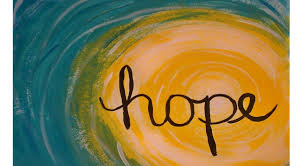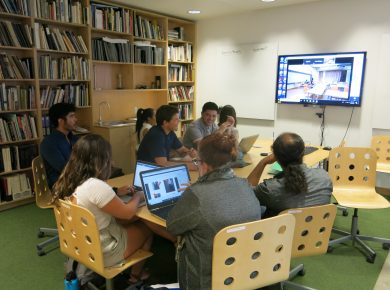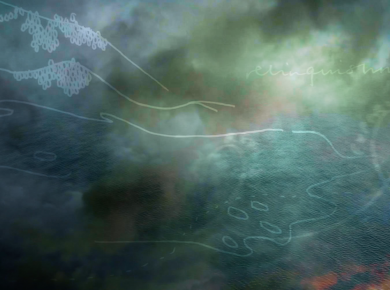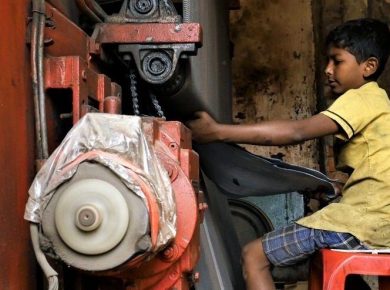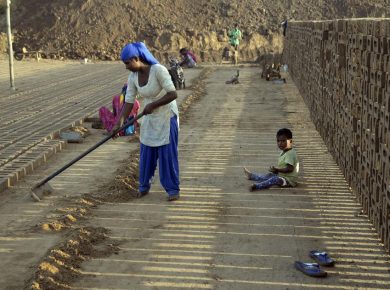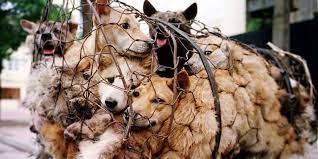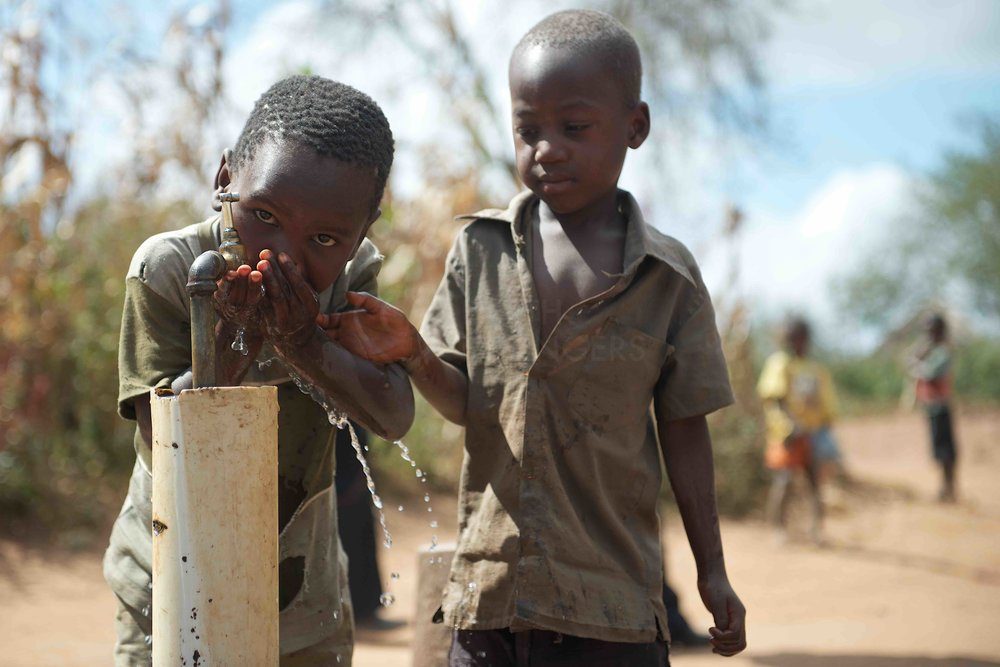
Water project in Malawi. Picture: Earthchangers.
Last year, in a New York Magazine essay called The Uninhabitable Earth, writer David Wallace-Wells painted a terrifying picture of climate meltdown, encompassing widespread famine, swelling seas and drowning cities. One sentence – “no matter how well-informed you are, you are surely not alarmed enough” – pretty much sums it up.
Some of Wallace-Wells writes may be true – and for many of the poorest parts of the world, his words are already reality – but it is not necessarily useful. If we were to take everything Wallace-Wells wrote as gospel, we would come to a standstill of despair, divorced from an everyday reality that would appear increasingly meaningless in the face of the oncoming apocalypse.
The option – and the only way to survive – is optimism: the belief that, while problems exist, they are not insurmountable and that human ingenuity and imagination will find ways through to a habitable world. A new global survey commissioned by Solitaire Townsend, co-founder of Futerra, shows that amongst adults aged 16 to 64 in 26 countries, 56% per cent were optimists, with a significant percentage describing themselves as ‘soft optimists’ (we can and we might).
Debate between climate optimism and fatalism continues apace. Critics of the first argue that optimism leads to complacency, a loss of energy; critics of the second, that fatalism leads to paralysis and despair.
The answer, as in so many things, needs to be a balance of the two. Or as Townsend so eloquently put it, in an article in the Huffington Post, “Optimism is a steadfast belief that we must, we can and we will solve climate change. And that optimistic attitude will drive more action than pessimism or fatalism ever could.”
In an ongoing project, HowNow Magazine asks interviewees, each of them involved in some way in the movement toward a more sustainable future, a single question: what gives you hope? The answers are delicious, exciting – and real, directly from those on the frontline. If it all gets too much, take inspiration here.
“Sustainable tourism [gives me hope]. It’s how I live my life. It’s my passion. Tourism can have a positive impact, particularly as an industry sector, because it reaches every corner of the world like no other sector can. And that’s going to grow. If it has that influence, that can be used for good. More and more people are aware of that and even some big companies are doing incredible work. There’s a lot going on at grassroots and policy level, and at company level. At the moment, the missing link is consumer understanding and demand. As soon as that’s there, this market will take off. That’s just awareness and understanding.”
https://www.earth-changers.com. Twitter: @Earth_Changers_. Instagram: @earthchangers. Facebook: @earthchangers.travel
“Laws are changing. Over the past five years, Kenya has strengthened her wildlife trafficking legislation. The law and penalties are now real deterrents. Additionally, there are NGO monitors in courtrooms observing wildlife trafficking cases to ensure that justice is served and the law is abided by. The US passed a “near total ban” on the ivory trade, 44 states have passed state legislation on ivory and the trafficking of other endangered species. China passed an ivory ban and so has Hong Kong. There is a global movement happening. As each domino falls, the next can be the point of focus. There is also the recognition that attempts to maintain legal markets have failed worldwide and the trade must come to a full end because legal markets are providing cover to launder smuggled ivory and it’s making it harder for law enforcement to uphold the law.”
www.thelastanimals.com. Twitter: @TheLastAnimals. Instagram: @thelastanimals. Facebook: @TheLastAnimals
“There’s a growing groundswell of activity and energy in this regard across the world; a general sense of energy about this whole conscious awareness and conscious consumption. It’s really happening and hat gives me hope that actually this thing will be designate throughout society so we all start voting with our feet to brands and big copropart and saying we know where you’re at. Where are your zero taste policies, your packaging revolution? We don’t want to buy your stuff anymore. it’s the future generation and the generation of now, it’s our generation now that will effect that change.”
www.tinyleaflondon.com/. Twitter: @TinyLeafLondon. Instagram: @tinyleaflondon. Facebook: @TinyLeafLondon
“Young people. Yesterday, we had a 16 year old kid come in the factory called Danny who is starting his own eco fashion business, Danny Direct, that makes more environmentally conscious footy kit for people who go play 5 a side. His enthusiasm and values were energising. It almost feels like younger people are starting to switch from valuing wealth to valuing the purpose of their lives. That is a game-changing attitude.”
https://rapanuiclothing.com/. Twitter: @Rapanuiclothing. Instagram: @rapanuiclothing. Facebook: @Rapanuiclothing
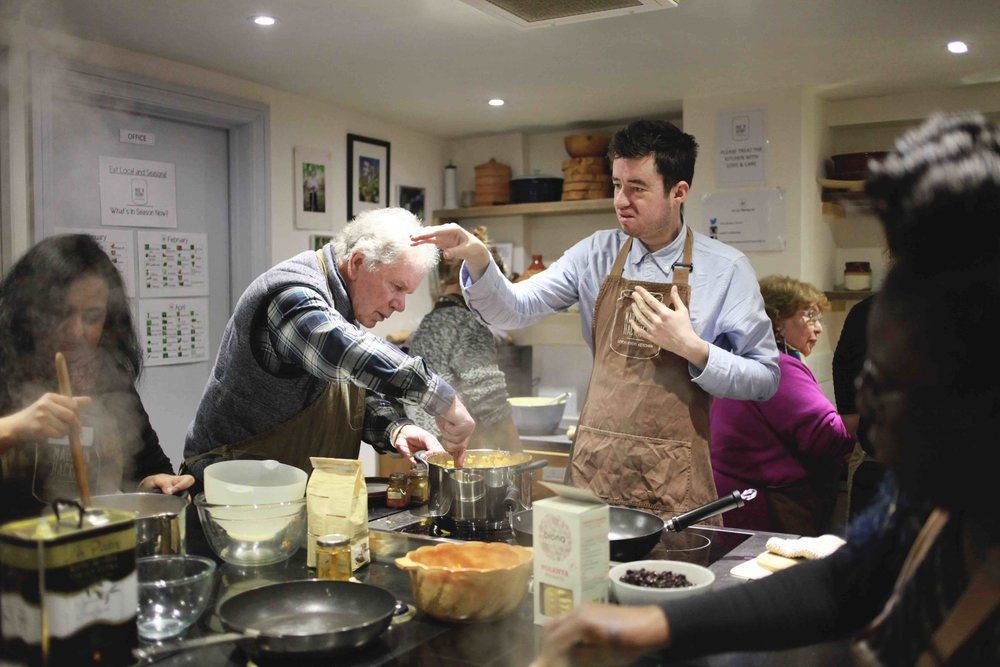
Participants from Deaf Plus, a charity that supports people with hearing issues, get stuck in at a Made In Hackney cookery class. Photography: Danielle Morainna.
“The price of solar has crashed down, revolutionising the way people find energy in developing markets like Africa. That’s really encouraging. Loads more of the world is under formal conservation – you’re not allowed to damage it, etc. I’m optimistic actually about a lot of this and about local politics. There’s the amazing COP agreement from 2015. I think it’s too late but that’s not the point. It’s an incredibly symbolic gesture that governments around the world agreed we have this huge problem caused by humans but that we can do something about it. That’s an absolutely huge step.”
www.wanderinggaia.com. Twitter: @WanderingGaia.
“Definitely the up-and-coming young people. There’s a great [reservoir] of power out there and great things to come from many of them. [There’s also] the growing interest in issues that, 20 years ago, would have had no attention – such as ocean plastic, the persecution of raptors on the upland moors. There seems to be, facilitated by a lot of young people, a growing level of public awareness. In my eyes, only good things can come of that.”
https://www.newnature.co.uk/, Twitter: @NewNature_Mag. Instagram: NewNature_Mag
“People are interested in this story. People want to know more, they want to follow this and see it as something that they want to be a part of. I work with three amazing women who have graduated from the creative industry but don’t want to be associated with the kind of damage it’s doing and want to do something different. Fashion Revolution gives me hope that, if we can bring the human side back into fashion through showing the people who are making these clothes, no one can turn a blind eye to that. It puts it so much in front of people that they have that instant connection. You don’t have that when you look at a label; ’Made in Bangladesh’ doesn’t tell you who’s made it, how it’s made, how long it’s taken or whether that person was even paid at all.”
www.nellyrose.com; Twitter: @nellyroselondon. Instagram: @nellyroselondon
“I do a talk in universities about ethical fabrics and there’s always a point at which I kind of think ‘oh, my gosh, this is so depressing. Everything I’m saying is so negative, negative, negative’. Then I talk about the people who are doing amazing things and making a difference and who are taking a stand. That, for me, is so positive. Sometimes it feels like ‘is this working? Is this having any effect?’ but I undoubtedly think that it is. I’m so pleased to see people like Emma Watson getting on board and promoting it. It’s more visible with social media and people like her really help to get that message out there. That for me is super positive.”
https://www.offsetwarehouse.com/. Twitter: @OffsetWarehouse. Instagram: offset_warehouse

Campaign group Anonymous for the Voiceless works powerfully for the rights of animals trapped in factory farming.
“What gives me hope? The youth getting involved in animal rights. The average age is mid to early 20s. The other thing that gives me hope is the natural compassion that all humans have. If you were to do a survey right now, 99 per cent of people would say they’re against animal cruelty and unnecessary animal suffering but the majority of them are probably still paying for it to happen. Not everyone is an animal lover but naturally people are against all suffering, whether that be human or animals. People say we are born vegan and I do believe that; it’s just about reconnecting people with animals and innate values that have been ripped away by advertising and tradition and conditioning. It’s a big fight because we’re up against – years of conditioning and trillions of dollars of marketing – but we do have the truth and justice and peace on our side. If you look at history and other social justice movements, like suffragettes, it always took a small group of people to convince the masses that something was morally unjust.”
www.anonymousforthevoiceless.org. Instagram: @anonymousforthevoiceless . Facebook: @anonymousforthevoiceless
“The idea that mentalities are changing and that individual actions aren’t a drop in the bucket. I see people really taking accountability for their day-to-day choices. The only way to create systemic change is by having that attitude: that all of our choices matter and that we have the power to make choices for the worlds we want to live in. We have the power to vote with our wallets and support companies that share those values. We live in a capitalist society and businesses run a lot of things and have a lot of power; as consumers, if we start putting these values at the forefront of how we’re making decisions, businesses have to respond to that to survive and adapt and maintain the market share that they hold so dear. The idea that someone else will fix [everything] is gone. Now is the time to become an empowered person.”
www.mamoq. com. Twitter: @think_mamoq. Instagram: @think_mamoq. Facebook: @think.mamoq.
